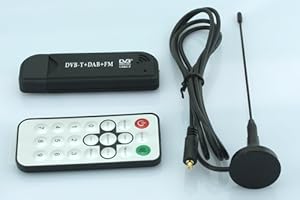Hello!
I'm a bit of a newbie here and with SDR in general, but I had a question about RTL-SDR dongles.
From what I've heard and read so far, RTL-SDR dongles are the cheapest way of getting into SDR while still having a fairly quality product. I impulse-bought a dongle a few months ago when I saw it for $3 with free shipping on Amazon, it was this one:

Utilizing the RTL2832U chipset.
When playing around with it recently, I quickly realized that the stock antenna is terrible, and that I was going to have to upgrade.
My question: Should I buy a new adapter with a normal (I don't know the proper terminology, so forgive me) coax jack on it, or do they sell adapters that can go from this much smaller size to your normal antenna-sized coax?
Again, excuse my noobishness, sorry!
Thanks for anyone that can help, I've been looking around on here and on the Wiki and stuff, but was unable to find any info on it (I think its just because I don't know the right words to search)
I'm a bit of a newbie here and with SDR in general, but I had a question about RTL-SDR dongles.
From what I've heard and read so far, RTL-SDR dongles are the cheapest way of getting into SDR while still having a fairly quality product. I impulse-bought a dongle a few months ago when I saw it for $3 with free shipping on Amazon, it was this one:

Utilizing the RTL2832U chipset.
When playing around with it recently, I quickly realized that the stock antenna is terrible, and that I was going to have to upgrade.
My question: Should I buy a new adapter with a normal (I don't know the proper terminology, so forgive me) coax jack on it, or do they sell adapters that can go from this much smaller size to your normal antenna-sized coax?
Again, excuse my noobishness, sorry!
Thanks for anyone that can help, I've been looking around on here and on the Wiki and stuff, but was unable to find any info on it (I think its just because I don't know the right words to search)

